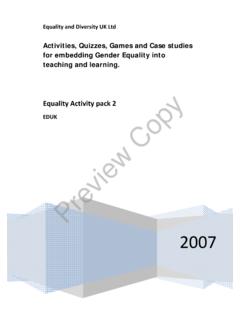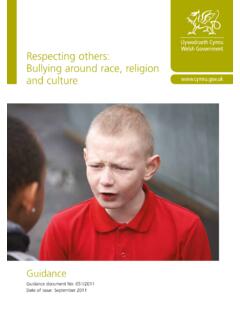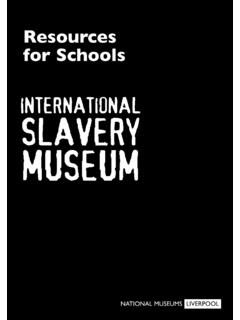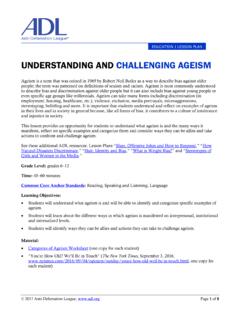Transcription of Why culture matters for children’s development and …
1 Information for families and early childhood educators Component 1 Creating a sense of community1 Why culture matters for children s development and wellbeingWhy culture matters for children s development and wellbeing Contents fDiversity in Australia fWhat is cultural diversity? fDiversity and belonging fHow does diversity influence children s mental health? fChallenges that may affect children and families from culturally diverse backgrounds fDeveloping relationships fThe role of early childhood education and care servicesAustralian Bureau of Statistics (ABS) (2011) Reflecting a nation: Stories from the 2011 Census, 2012 2013 (No. ) Canberra: Author Australian Bureau of Statistics (ABS) (2009) Yearbook Australia, 2009 10: Characteristics of the population (No. ) Canberra: Author Diversity in AustraliaOur community in Australia is diverse. Census figures now show that 27% of the resident Australian population were born overseas (ABS, 2011). In addition, 20% of Australians have at least one parent who was born overseas (ABS, 2011), and the number of languages spoken at home by Australians is more than 400 (ABS, 2009) Early childhood education and care (ECEC) services in Australia therefore have contact with families from many different cultural backgrounds Humans are cultural beings We learn to communicate and understand our world through the context of our languages, traditions, behaviours, beliefs and values.
2 Our cultural experiences and values shape the way we see ourselves and what we think is important When individuals are part of a cultural group, we learn the ways of that culture (e g , behaviour and beliefs), which enable us to feel like we belong to our community. Cultural perspectives also influence how we parent, how we understand children , how we help them grow up and how we teach them new skills Migration has contributed to the richness in diversity of cultures, ethnicities and races in Early Childhood culture matters for children s development and wellbeingWhat is cultural diversity? Cultural diversity refers to people who identify with particular groups based on their birthplace, country of origin, ethnicity, language, values, beliefs or world views This does not mean that everyone from a particular cultural group will hold exactly the same values or do things in the same way Showing support for cultural diversity involves talking with people to build relationships, find out how best to include them and respect their cultural needs Valuing and respecting diversity encourages people to see differences among individuals and groups as common and positive Diversity and belongingRespect for diversity is related to people s sense of belonging When diversity is valued and respected people are more likely to develop a sense of belonging to their community and social connections to others People who have supportive and positive relationships in their life (e g , people to talk to, trust and depend on)
3 Are less likely to experience feelings of depression and anxiety compared to those who have fewer social connections Feeling cared about and respected is a protective factor for mental health and wellbeing A sense of belonging to a community and being socially connected to others acts as a buffer to stress when people are experiencing difficulties. children s connection to their culture develops through their experiences. In particular, warm and secure emotional connections with the adults who care for them help children connect with their cultural identity Having a strong sense of their own cultural history and the traditions associated with it helps children build a positive cultural identity for themselves This also supports children s sense of belonging and, by extension, their mental health and does diversity influence children s mental health?Babies and young children learn and develop through their early experiences and relationships As children get older they begin to develop a sense of who they are and where they belong.
4 For example, when children develop positive relationships with other children and educators, it helps them feel they belong to their ECEC service This early learning about themselves and others lays the foundation for their future health and wellbeing Early childhood is also the time when children first become aware of differences among people and start to form opinions and attitudes about these differences (e g , understanding the difference between a family member and a stranger or knowing the difference between males and females) This awareness also means young children are sensitive to experiences of racism and prejudice. This can impact on their social and emotional wellbeing, their learning and their social relationships children s ideas about, and responses to, diversity are influenced by their age as well as what they see and hear around them Young children are naturally curious about differences and one of the ways they make sense of their world is to sort things into different categories and focus on one thing at a time (e g , whether another child has the same or different skin colour to them) children do this as a way to organise their experiences.
5 Talking with children about differences allows them to feel good about who they are and appreciate diversity in themselves and others Belonging is a fundamental human need that relates to feelings of being valued, accepted, respected and cared about by for families and early childhood educators Component 1 Creating a sense of community3 Why culture matters for children s development and wellbeingChallenges that may affect children and families from culturally diverse backgroundsChildren and families from culturally diverse backgrounds may face a range of challenges as they find their way in the broader Australian society. Some of the common challenges are described below Talking about differences in everyday ways demonstrates respect, values individual characteristics and helps build an inclusive environment. Migration and resettlementPeople migrate from one country, region or place and settle in another for many reasons Individuals may migrate because they fear they will be harmed or discriminated against based on factors such as race, religion, or political opinion; they might voluntarily leave their country of origin to live in another country.
6 Or they might leave their country and ask to be recognised as a refugee to be protected Settling in a new country or community can be complicated Families need to find housing, employment, an ECEC service, develop social networks and make connections with agencies It is important that people who have migrated have access to support to help them settle into their new community Not knowing how things work in the new community can make resettling more challenging and stressful Family, friends and others who would normally provide support may have been left behind in the move There can be feelings of loneliness, isolation or worry for those left behind. These difficulties affect all members of a family Language and communicationLanguage can sometimes be a major barrier for families new to Australia Difficulties communicating in English can cause a lot challenges for families trying to find their way in their new community. Language barriers can undermine people s confidence, make everyday life harder and make it harder to form social connections Language barriers can also make communication with ECEC services more difficult for parents and carers.
7 Families benefit from being able to communicate in the language they are most comfortable with If they want to, families can also be supported to develop their English language skills When the experiences, practices and beliefs of families from different cultural backgrounds are not recognised or valued, it can also lead to miscommunication or misunderstandings. For example, in some cultures it is fine for people to directly decline an invitation or say that they disagree with someone; but in other cultures this is not polite and people prefer to say nothing rather than to say no If these differences are not understood by both people, it can lead to miscommunication and misunderstandings on both sides KidsMatter Early Childhood culture matters for children s development and wellbeingEffects of traumaMigration prompted by particularly stressful experiences, as is often the case for refugees, can lead to additional challenges for resettlement and wellbeing Traumatic experiences may have occurred through being exposed to violence, war or torture children and families may have lived under threat and in fear; they may have witnessed the deaths of relatives or friends.
8 Or experienced hardship and danger when coming to Australia Some have received harsh treatment in immigration detention on their arrival here Refugees may continue to have strong feelings of fear, as well as shame and guilt about past events These kinds of events are highly stressful and can still affect a person long after they have passed. Everyone s experience of and reaction to trauma is different, including young children . Some children experience an increase in fear and anxiety, particularly when they are away from their families or familiar surroundings. Other children sometimes re-experience the trauma, perhaps through bad dreams or nightmares. Some children also experience difficulty trusting and connecting with other people, making it difficult for them to form relationships with other adults or with their peers Feelings of pain and anger can also be seen in the behaviour of some children who have been traumatised, in the form of tantrums, aggression or high levels of emotional reactivity (e g , becoming very upset quite easily) Traumatised children can also have difficulty learning new skills and their development can be affected.
9 children may need support to understand and deal with these difficulties because they are often hard for them to talk about or describe Discrimination and racismSometimes people may resort to harmful words and behave negatively toward others as a way of managing their fears and lack of understanding about differences This is called discrimination Discrimination impacts negatively on individuals and entire communities Being subject to discrimination can be a difficulty faced by many people from diverse backgrounds. This can be especially an issue for minority groups, such as those who look different from the majority of a population Both direct discrimination (e g , name calling and bullying ) and indirect discrimination ( , ignoring or excluding others from important events) can leave people feeling shut out and powerless This can then have a negative impact on mental health and wellbeing of both children and adults The effects of racism and discrimination make life more difficult for families, and create undue stress and social disadvantage racism increases children s sense of difference and vulnerability by devaluing them and their culture and making them feel unwelcome Valuing diversity and being inclusive also helps promote respectful relationships and reduces the likelihood of discrimination and isolation Information for families and early childhood educators Component 1 Creating a sense of community5 Why culture matters for children s development and wellbeingParenting across culturesParenting across and between cultures can be sometimes be stressful There are many differences in parenting practices between cultures, including (but not limited to)
10 The ways children are shown affection, attitudes towards discipline and how much emphasis is placed on family responsibility compared with promoting children s independence Some cultural practices can have very strict codes of behaviour according to a child s age or gender Families might also be concerned about children losing their cultural identity through contact with children with different cultural backgrounds, attending ECEC services with attitudes different to theirs or through exposure to the to more than one cultural group can sometimes be challenging for children too. children from diverse cultural backgrounds often find differences in the values and expectations of them at home and at the ECEC service they attend. Sometimes this means they feel confused about what is expected of them at both places. At other times it can mean that they are faced with difficult choices when the expectations of others do not meet way of supporting children from culturally diverse backgrounds at the ECEC service is for families and educators to discuss possible differences in parenting If this doesn t happen, cultural differences in parenting practices can lead to tension or misunderstandings between families and educators, and confusion for children Educators can support children better when they respect and understand that they come from diverse backgrounds and have different cultural identities (including specific expectations of behaviour and communication) Also, under these circumstances, children and their families feel more comfortable in and valued by their ECEC service Respecting diverse cultural backgrounds helps individuals feel valued within their community.






